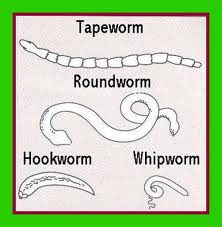Articles tagged with: puppy worms
Dog Health »
Puppy worms are very common
Many people do not realize that worms in puppies can be fatal. Puppy worms are very common, so there is no need to be stressed if you notice your puppy does in fact have worms. If you notice worms in your puppy, try to get him to the vest ASAP for exact diagnosis and deworming.
There are many ways for puppies to get worms:
- From his mother.
- From contact where traces of old puppy feces are found.
- From contact with other puppies infected.
- Fleas that are infected with tapeworms.
 [/caption]
[/caption]
Common Puppy Worms
- Roundworms
- Hookworms
- Tapeworms
- Whipworms
Signs of puppy worms:
- Biting or licking around the anus
- Anemia and pale gums
- Swollen belly
- Vomiting
- Poor growth
The most common worms in puppies are roundworms. Most all puppies get roundworms at some point in their puppyhood. Roundworms are in the intestines of puppies often causing a big bloated fat belly and poor growth.
Tapeworms can be a major problem when flea infestation is high. Tapeworms are a small intestine parasite. They look like grains of rice when dried and can normally be noticed in the dog’s stool. Over-the-counter wormer is not recommend as tapeworms require a different wormer than most puppy worms. If you suspect your puppy has tape worms, it is suggested you seek vet care.
Hookworms are small, thin worms that are found in the small intestine and suck blood from your puppy. Severe hookworm infestation are lethal to puppies. Signs of hookworms include diarrhea, weight loss, and weakness. Diagnosis is made by examining the feces, so your vet will need a stool sample.
Whipworms are substantially smaller than most worms and are not saw without the aid of a microscope. Occasionally adult whipworms can be seen in the stool when the infestation has already caused some debilitation or weight loss in the dog. A few whipworms generally do not pose a problem for a dog but if large numbers of worms are present in the large intestine tissue, inflammation can result leading to a bloody diarrhea.
Proper care for your puppy is necessary to prevent and treat puppy worms. If you suspect your puppy is infected with any worm, it is best to seek the help of a vet for proper deworming.
Photo source:webanswers.com/pets/dogs
















 The
The